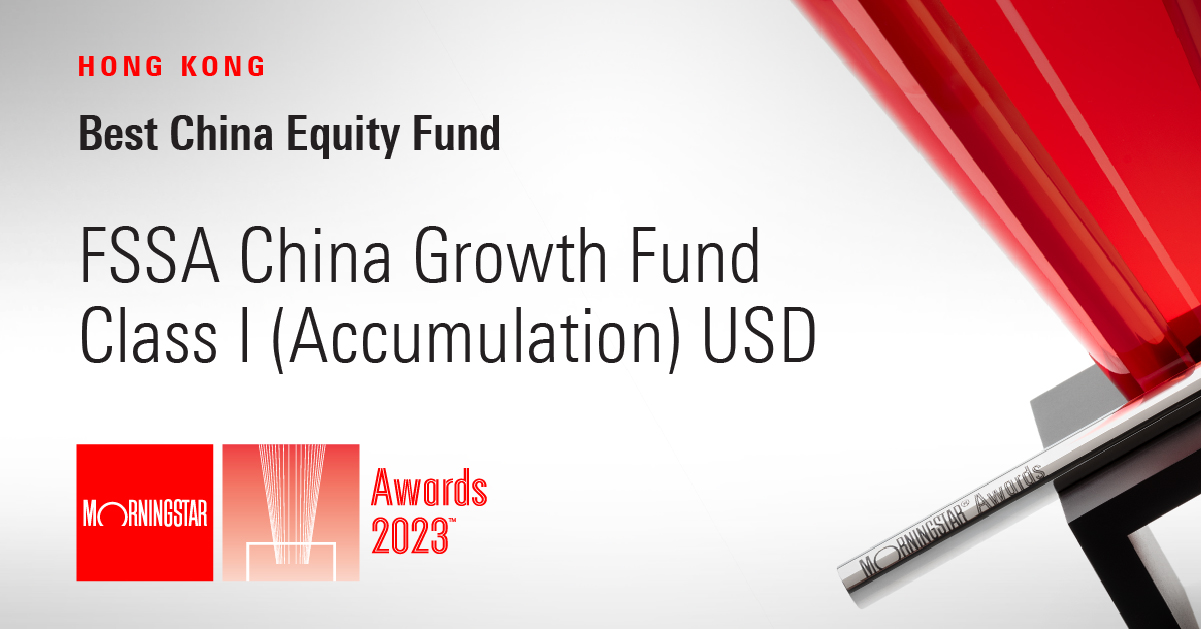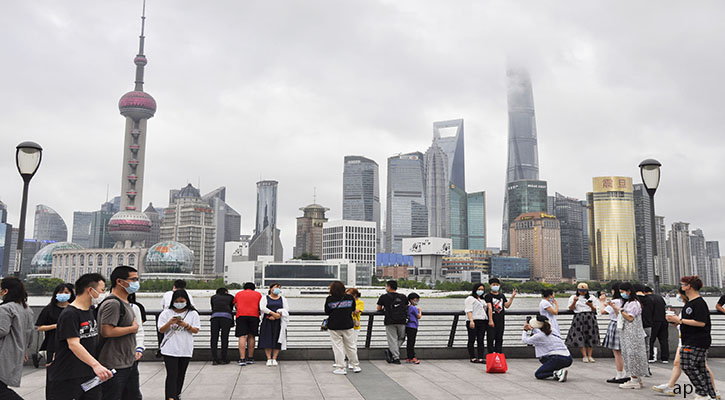
FSSA China Growth’s strong investment team and time-tested investment process make it an outstanding choice for investors who seek China exposure. The vehicle now receives Morningstar Analyst Ratings of Gold across all share classes.
“The team continues to sport a strong investment culture, one that aligns its interest with investors and is mindful of succession planning,” says Chloe Qu, senior manager research analyst at Morningstar.
Qu continues: “Another strength of this strategy is its well-structured and thorough bottom-up research process, which has delivered impressive track records across all of Lau's Asian and Greater China equity mandates over the long haul. The team aims to identify quality growth companies at reasonable valuations, with particular attention paid to management quality. Other trademarks of the investment process include its absolute return focus, low portfolio turnover, and benchmark-agnostic approach. Indeed, Lau’s focus on management quality and absolute returns has provided the strategy with strong downside resilience. During the three recent market declines in 2018, 2021, and 2022, the strategy has outperformed the index and peers.
“A best-of-breed portfolio manager supported by a strong analytical team continues to warrant a People rating of High… The team's bottom-up, quality-focused investment process is well-structured and has generated strong risk-adjusted returns over multiple cycles. A long-tenured and skillful manager further ensures a consistent application of process. It continues to earn a Process rating of High.”
Morningstar: How was the portfolio positioned to navigate the market volatility in 2022? Were there any particular holding(s) or theme(s) that drove the fund’s performance for the year?
Martin Lau: As long-term investors, one of our key strengths is looking beyond any near-term market volatility and focusing on positioning our portfolios to benefit from structural and secular growth trends in China.
Amid the widespread pessimism, we did not waver from our philosophy or process and continued to buy high-quality companies at attractive valuations. The last couple of years was a harsh reminder of the volatility inherent in the China market, but it also highlighted the advantages of having a long time horizon. While we had similar concerns as everyone else, such as tightening industry regulations, geopolitical tensions, and China’s prolonged zero-COVID policy, in our view much of the negativity was already priced in – and we believed sentiment could improve quickly once China opened up.
We also thought the structural investment themes in our portfolios remained intact. For example, we hold dominant consumer franchises and brands which should benefit as the population becomes wealthier. China’s aging population and rising spending on healthcare should support the companies providing drugs and medical services. And technology champions in niche markets should benefit from the trend toward localized production.
One example where our conviction increased is Shanghai Hanbell Precise Machinery (002158), a leading maker of screw compressors that are used in cooling and general industrial applications. The company is also an emerging player in vacuum pumps, which are used in solar and semiconductor industries, among others. We were impressed after meeting the chairman, who seemed strategic, optimistic, and devoted to the business. He stayed in the firm’s employee dormitories in Shanghai amid the citywide lockdowns, which bolstered our confidence in his alignment. The operations seemed well-run with clear budgets for each business line, and he answered our questions with candor. In an industry prone to industrial cycles, the team values steady growth and high-end products with good profitability. Since the timing of China’s reopening was unknowable, we looked for companies that took the opportunity of the downturn to streamline and focus on improving for the long term.
We favored businesses, which were able to adapt to the situation. Examples included cutting costs amid slowing sales, which we saw with home appliances maker Midea Group (000333); passing through price increases from input inflation, as shown by Beijing New Building Materials (000786) with its gypsum boards; or investing in new capacity and innovation to gain market share, like in the case of pneumatic components supplier Airtac.
Morningstar: With various central banks rolling back their stimulus measures, inflation, and ongoing geopolitical tensions, what is your outlook for 2023, and how are you expressing these views in your portfolio?
Lau: China’s steps toward reopening should be positive for growth in the coming year, though it will take some time to normalize and there is still uncertainty ahead. Though restrictions have largely been lifted, factory and business closures due to pandemic lockdowns over the past three years have affected household income and weakened spending power.
And with COVID cases on the rise, social activities have yet to rebound, with in-restaurant dining and movie theatre attendance still significantly below prepandemic levels. In the longer term, we believe that China’s structural growth drivers remain intact. Rising wealth and incomes should continue to drive the shift toward a consumption-led economy and increase demand for better-quality (and higher-priced) goods and services. Meanwhile, China’s growing sophistication in technology and innovation in manufacturing should help its domestic champions move up the value chain and benefit from the growing preference for home-grown goods and components.
Morningstar: What are the key ingredients to your fund’s longer-term success?
The first principle for investing in Asia and emerging markets – particularly for long-term buy-and-hold investors like us – is patience. It is rare to identify companies that have both a quality management team and a franchise that compounds free cash flows (or book value per share) at attractive rates for long periods of time. Where we have managed to find such companies, we believe the most important thing is to hold on and do nothing.
Secondly, as bottom-up investors, we look to identify companies with great management teams and strong franchises that are able to grow sustainably over the long term. We don’t pay too much attention to short-term macro forecasts or political events. They are outside of ours. However, in some rare instances, external macroeconomic issues can completely swamp even the best-run company.
We have learned some expensive lessons over the years, with the outcome being that we now systematically check and limit our portfolio exposure to so-called “high-risk” economies (simplistically defined as those with adverse macroeconomic conditions).
Thirdly, we believe it is important to stay disciplined through market mania. When it comes to investment performance, avoiding mistakes is just as important as selecting potential winners. During late 2020 and through 2021, there was a frenzy of initial public offerings, most of which had dubious business models and sketchy financials. Meanwhile, valuations lost all relation with fundamentals as companies that were beneficiaries of COVID-induced work-from-home strictures were bid up to stratospheric levels.
Most of the “stars” of this time were businesses that we call “Growth Traps”. They are characterized by a business model wherein a constant supply of capital is needed to fuel growth despite mounting operating losses. There is no evidence yet of such companies being able to capture the profit pool they have destroyed in their quest for scale. In these phases, it is important to stay disciplined and not be enticed into overpaying for stocks. Our team helps us stay grounded and avoid mistakes in times like these. We have not participated in any IPOs over the past few years, most of which are now languishing below the listing price. Nor have we bought into flawed business models that promise a “path to profitability”.
Our fourth principle is about remaining long-term-minded. The COVID-19 pandemic has dominated most aspects of life and business for nearly three years now, with places like China still battling the spread of the virus. Several of our holdings were also significantly challenged during the pandemic as the unprecedented lockdowns took its toll on their businesses.
At this point, we took a step back and conducted a deep-dive review of our holdings. We had calls with management teams and re-evaluated their businesses. This gave us greater conviction in the longer-term trajectory of our holdings. The majority of them are market leaders, and we realized that if they were struggling, their competitors would be even worse off. It became increasingly clear that when the lockdowns eventually ended, our holdings should have an even higher market share and face less competition. As such, even though the early stages of the pandemic were particularly challenging, we tried to look beyond the immediate situation – and we found some attractive bargains.
Finally, we believe it is important to stick to the process. In seeking companies to invest in, we apply our competitive advantage framework on prospective holdings, looking for those with good governance, strong business models, solid long-term prospects, clearly defined competitive advantages, and high cash generation. Our fundamental company analysis incorporates both qualitative and quantitative research that is designed to assess a company’s ability to compound cash flows sustainably and at high rates over the medium to long term.












.png)









